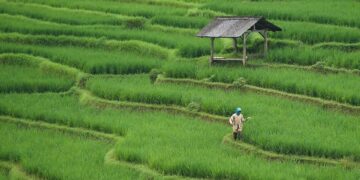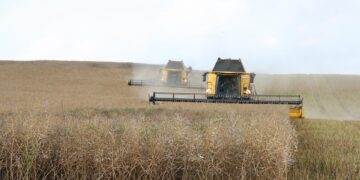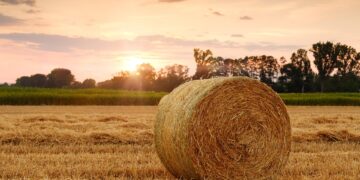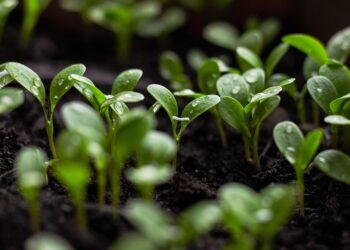Harvesting Diversity: The Key to Sustainable Agriculture
When it comes to sustainable agriculture, one of the most important factors to consider is diversity. By harnessing the power of diversity in farming practices, farmers can not only improve their crop yields and resilience to pests and diseases but also contribute to the overall health of the environment. In this article, we will explore the importance of diversity in agriculture and how it can be harnessed to create a more sustainable farming system.
The Benefits of Diversity in Agriculture
Diversity in agriculture refers to the practice of growing a variety of crops and raising a variety of livestock on a single farm or in a single area. This can include planting different types of crops in the same field, rotating crops from year to year, and integrating livestock into the farming system. There are several benefits to incorporating diversity into agricultural practices:
Increased Resilience
One of the key benefits of diversity in agriculture is increased resilience. By growing a variety of crops, farmers can reduce their vulnerability to pests and diseases that may affect a single crop species. For example, if a particular pest targets a specific crop, having a diverse range of crops planted in the same area can help to minimize the impact of the pest and prevent widespread damage to the entire crop.
Improved Soil Health
Diversity in agriculture can also help to improve soil health. Different crops have different root structures and nutrient needs, which can help to break up compacted soil, increase organic matter content, and reduce erosion. Additionally, incorporating livestock into the farming system can provide natural fertilizer and help to improve soil structure, leading to healthier and more productive soils.
Enhanced Biodiversity
By incorporating diversity into agricultural practices, farmers can help to promote biodiversity on their farms. Different crops and livestock species provide food and habitat for a variety of beneficial insects, birds, and other wildlife, creating a more balanced and resilient ecosystem. This can help to support pollinators, natural predators of pests, and other beneficial organisms that contribute to a healthy and sustainable farming system.
Practical Strategies for Harnessing Diversity in Agriculture
There are several practical strategies that farmers can use to harness the power of diversity in agriculture:
Crop Rotation
One of the most common strategies for incorporating diversity into agricultural practices is crop rotation. By planting different crops in the same field from year to year, farmers can help to break pest and disease cycles, improve soil health, and increase overall crop yields. For example, planting legumes such as peas or beans can help to fix nitrogen in the soil, which can benefit subsequent crops that have higher nitrogen needs.
Interplanting
Another strategy for increasing diversity in agriculture is interplanting, or planting different crops together in the same field. This can help to maximize the use of space, reduce competition for resources, and create a more balanced ecosystem. For example, planting a mix of crops with different root depths can help to improve soil structure and reduce erosion, while also providing a variety of food sources for beneficial insects and wildlife.
Integrating Livestock
Integrating livestock into the farming system is another effective way to increase diversity in agriculture. Livestock can help to improve soil health by providing natural fertilizer, control weeds and pests by grazing on cover crops, and provide additional income for farmers. By incorporating livestock into the farming system, farmers can create a more sustainable and resilient agricultural system that benefits both the environment and the bottom line.
Challenges and Solutions
While diversity in agriculture offers many benefits, there are also challenges that farmers may face when trying to incorporate diversity into their farming practices. Some of the common challenges include:
Market Demand
One of the main challenges that farmers face when trying to incorporate diversity into their farming practices is market demand. Many consumers are used to buying a limited range of crops and products, which can make it difficult for farmers to sell more diverse products. However, by marketing the benefits of diversity, such as improved taste, nutrition, and environmental sustainability, farmers can help to create a demand for more diverse products and increase the profitability of their farming operations.
Knowledge and Skills
Another challenge that farmers may face is a lack of knowledge and skills in incorporating diversity into their farming practices. Many farmers may be used to growing a limited range of crops or raising a single type of livestock, and may not have the expertise to diversify their operations. However, by providing training and support for farmers, such as through extension services, agricultural organizations, and peer-to-peer networks, farmers can learn new techniques and strategies for incorporating diversity into their farming practices.
Resource Constraints
Resource constraints, such as limited land, water, and capital, can also be a barrier to incorporating diversity into agricultural practices. However, by using sustainable farming practices, such as conservation agriculture, agroforestry, and water-saving irrigation techniques, farmers can maximize the use of their resources and create a more diverse and resilient farming system. Additionally, by partnering with other farmers, conservation organizations, and government agencies, farmers can access additional resources and support to help them incorporate diversity into their farming practices.
Conclusion
Overall, diversity is a key factor in creating a sustainable and resilient agriculture system. By harnessing the power of diversity in farming practices, farmers can increase their resilience to pests and diseases, improve soil health, promote biodiversity, and create a more balanced and sustainable ecosystem. While there are challenges to incorporating diversity into agricultural practices, such as market demand, knowledge and skills, and resource constraints, there are also practical strategies and solutions that farmers can use to overcome these challenges and create a more diverse and sustainable farming system. By working together and sharing knowledge and resources, farmers can harness the power of diversity to create a more sustainable and resilient agriculture system for future generations.











